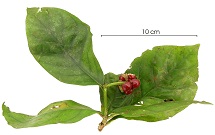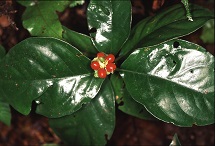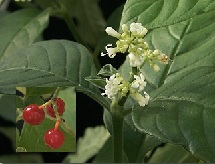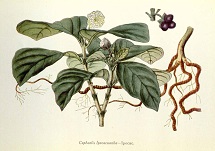 Psychotria ipecacuanha
Psychotria ipecacuanha
immature fruit plant
 Psychotria ipecacuanha
Psychotria ipecacuanha
fruit plant
 Carapichea ipecacuanha
Carapichea ipecacuanha
(Brot.) L. Andersson
 Cephaelis ipecacuanha
Cephaelis ipecacuanha
illustration
|
- epecacuanha (Oxford
Dictionaries)
1 The dried
rhizome of a South American shrub, or a drug prepared from
this, used as an emetic and expectorant.
2 The shrub that
produces ipecacuanha, native to Brazil and cultivated
elsewhere.
Cephaelis ipecacuanha, family Rubiaceae
2.1 Used in
names of other plants with similar uses to ipecacuanha, e.g.
American ipecacuanha.
Origin
Early 17th century: from Portuguese, from Tupi-Guarani ipekaaguéne 'emetic
creeper', from ipe
'small' + kaa
'leaves' + guéne
'vomit'.
- ipecac (WebMD)
Ipecac is a plant. It is used to make medicine. Ipecac syrup
is available both as a nonprescription product and as an
FDA-approved prescription product.
Ipecac is taken by mouth to cause vomiting after suspected
poisoning. It is also used to treat bronchitis associated with
croup in children, a severe kind of diarrhea (amoebic
dysentery), and cancer. Ipecac is also used as an expectorant
to thin mucous and make coughing easier. Small doses are used
to improve appetite.
Health professionals sometimes give ipecac by IV
(intravenously) for hepatitis and pockets of infection
(abscesses).
How does it work?
Ipecac contains chemicals that irritate the digestive tract
and trigger the brain to cause vomiting.
- M. R. Lee, "Ipecacuanha:
The South American Vomiting Root," Journal
of the Royal College of Physicians of Edinburgh 38.4
(2008)
The story of ipecacuanha, derived from the plant Cephaelis,
is a fascinating one. It was discovered in Brazil in the 1600s
and then transported to Paris in the latter part of the same
century. It was used there by the physician Helvetius on
various members of the French royal court to treat the flux
(dysentery) with some success. Later, in the eighteenth
century, it was taken up by the physician and privateer Thomas
Dover and became, with opium, a fundamental constituent of his
celebrated powder, which was used widely to treat fevers and
agues for the next 200 years. Progress was then delayed until
the early 1800s when the School of Chemistry at Paris
established that the dried root of ipecac contained two
powerful alkaloids, emetine and cephaeline, that consistently
caused vomiting and diarrhoea. The discovery of the pathogenic
amoeba, Entamoeba
histolytica, in the latter part of the nineteenth
century, allowed a distinction to be made between the two main
forms of dysentery (amoebic and bacillary). Emetine was shown
to be active against the amoebic form of dysentery but
ineffective against that caused by bacteria. Ipecacuanha, its
root and the pure alkaloid emetine have now been abandoned on
the grounds of toxicity. They have been replaced by safer,
more effective compounds. Nevertheless, they deserve an
honoured place in the history of medicine, especially in the
search for an effective treatment for amoebic dysentery.
|



